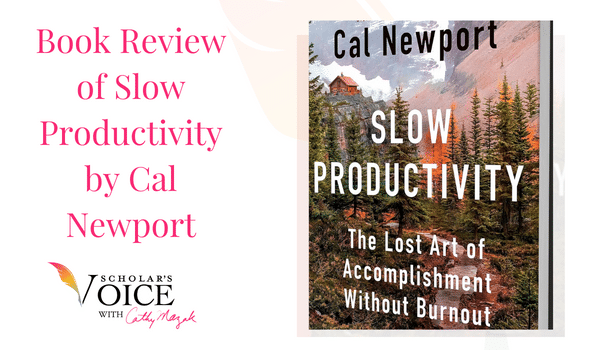How to Approach Your Writing Like a Project Manager

For successful execution of the day-to-day tasks of academia, especially writing, we need to be good project managers.
MORE DETAILS
As academic women, we are required to balance multiple projects at the same time, from writing and publishing to course prep to service work. The day-to-day project management tasks of the academic life are not part of our training. In some cases, these tasks are modeled by excellent mentors,but most of the time we’re making it up as we go along.
If you’ve been following along, you know that I’m on a one-woman mission to reveal all the “secrets” of how to do academia successfully so that we can all be happier, healthier, and more fulfilled in our careers. In this episode, we’re looking at how project management can help accomplish these goals.
“Without a system for project management, you’re going to feel overwhelmed and exhausted all the time, no matter how much progress you’re actually making.” -Cathy Mazak
Understanding the Basics of Academic Project Management
Before we jump in to how to build and execute our project management systems, it’s important to understand a few basic skills.
- Not all writing tasks involve actual writing. When I say “writing,” I don’t mean only putting words on a page. I mean all the things you must do to complete a writing project. These could include: reading, collecting data, analyzing, creating charts and graphs, proofreading, etc. By thinking about all of these things as writing, you will see progress towards your publication goals, even when you are not physically writing.
- A project is not the same thing as a task. The first step to managing your academic writing projects is to know the difference between a project and a task. Projects are big: writing an article, a book proposal, a grant. Tasks are small: Write the introduction, investigate competing titles, create the grant budget. Tasks are what we put on our calendars. Projects are what we put on our publication pipelines. If you’ve been writing “finish article” on your to-do list, it’s time to break it into manageable tasks.
- Estimating time for completing each task is critical. Most people underestimate how long it will take to do something. The danger of this is that you start to feel bad about your writing, which leads to guilt and overwhelm, writing’s two biggest enemies. Instead I want you to overestimate the time it will take you to do tasks. To maintain and perpetuate positive feelings about your writing tasks, you need to feel like you are “winning”, checking things off the list, moving projects forward. If you overestimate the time it takes to do a writing task, and then you get finished earlier: that’s what you want!
Many of the academic women I coach having been writing for years but still can’t put accurate time estimates on how long it takes for them to complete writing tasks. In this episode I talk about an exercise you can do to dial in your ability to estimate the size of your tasks. It’s important that each task is able to be completed in one hour or less.
- Scheduling tasks in your calendar. I recommend one of two methods: (1) actually give each task a due date or (2) have a prioritized bank of tasks and scheduled writing time; during the writing time you pull from the bank of tasks. Whichever method you choose, be sure your individual tasks have a place on your calendar.
Systems are the Foundation of Writing Project Management
It is best to work on one project at a time, but this is nearly impossible in academia. So strive to work on one writing project at a time and move it all the way to completion. Moving a project through your pipeline and to completion is dependent on implementing workable systems. Here’s how:
- Use templates to make common project tasks repeatable. So much of our writing energy goes to figuring out what to do next. A writing project management system eliminates this time spent thinking and planning at the beginning of every writing session. A “template” for academic writing projects is a generic task list and outline for that type of project.
“The benefit of templates is that they stop you wheel-spinning by making sure you never start with a blank page.” -Cathy Mazak
- Schedule time for project management. For people short on time, it might seem counterintuitive to add time to the calendar for project management. But this is a short, focused planning session that will save you so much time and energy later. You can use Trello or another project management tool, sticky notes in a calendar, or a bullet journal. The idea is to begin your week with the big picture of what needs to get done.
- Trust the System. Once you’ve set up templates for repeatable tasks and taken the time for project management, you need to trust the system and try it out for at least two weeks. Sometimes if I get stressed it is tempting to push my carefully laid plans aside. To combat this, I’ve adopted the mantra “trust the system.” When I want to ditch the plan I made the day before in response to something new that’s come up, I just tell myself to work on the things I planned to work on and deal with fitting in the new task when I get to my project management planning time at the end of the day.
Need Help with Implementing Academic Project Management?
I use Trello for my project management needs, and I am offering a course to show you how to use Trello to organize all of your academic projects. The course is called Organize Your Academic Life and includes a complete set of academic project management templates, made by me, for you. In the course I walk you through how to personalize and set up these templates and workflows for common academic projects on everything from co-authoring to communication with students and colleagues to research and writing. To find out more and sign up for the course, click here.
Connect with me:
RELATED PODCASTS
Stay current in Academic Publishing
Subscribe to our newsletter:
In the Pipeline
writing tips, publishing trends, reading recomendations, free workshops





